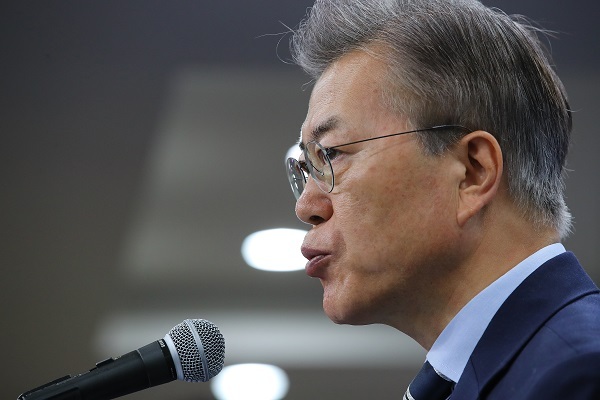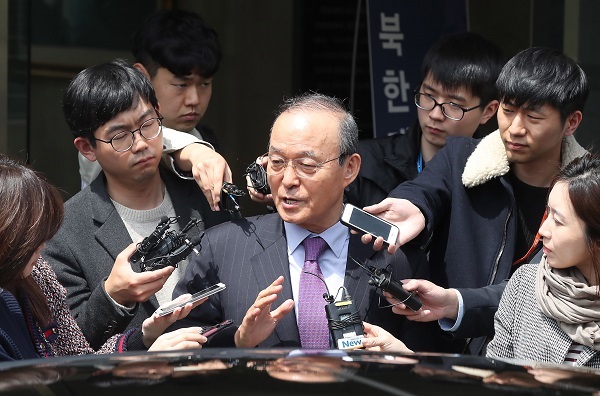Conflicts aggravated Monday between the Democratic Party of Korea’s presidential candidate Moon Jae-in and a former chief diplomat concerning their dissent over Seoul’s lenient policy decision on Pyongyang in 2007.
As the dispute continued to pose a setback to the presidential front-runner ahead of the upcoming May 9 election, the liberal party charged former Foreign Minister Song Min-soon with defamation. Song, while contradicting the party’s claim, stepped down from his position as dean of the University of North Korean Studies.

Democratic Party of Korea’s presidential candidate Moon Jae-in (Yonhap)
“It is politically and morally inappropriate to make such claim against a specific candidate ahead of the election without factual basis,” said Yoo Eun-hae, chief spokesperson for Moon’s campaign.
The party filed a complaint to the Seoul Central Prosecutors’ Office, charging Song with defamation by publication, slander against a presidential candidate, breach of the Public Official Election Law and leak of official secrets.
The former minister continued to stand at odds with Moon over the issue, but nevertheless offered his resignation to the university.
“I am caught up in the midst of a political argument against my own will,” Song told reporters at lunchtime while leaving the school located in Samcheong-dong.
“I decided to step down (from my dean post) lest such consequences affect the school in a negative way.”

Song Min-soon, the former foreign minister arguing with leading presidential candidate Moon Jae-in over Moon’s role in the South Korean government’s 2007 decision to abstain from a UN resolution on North Korean human rights abuses, answers questions from reporters at Jongno-gu, Seoul, Monday. Song, president of the University of North Korean Studies, tendered his resignation as university president on Monday morning. (Yonhap)
The entire strife between the two top-level officials of the former liberal Roh Moo-hyun government is pivoting on Song’s political memoir “The Moving Glacier,” published in October.
In the book, the former minister mentioned that then-presidential chief of staff Moon had led the government’s action to first consult the communist regime before making its decision to abstain from a UN resolution against Pyongyang’s human rights abuses.
Conservative parties at once brought up the anecdote to call into question Moon’s qualifications as the potential commander-in-chief amid rising military tensions between the two Koreas.
The dispute, which seemed to be overshadowed for some time last year by the corruption scandal involving former President Park Geun-hye, recently resurfaced during the election campaigning and television debates among presidential candidates.
The Moon-Song feud intensified over the weekend as both sides revealed a series of documents to back their respective claims.
Song suggested a letter from the late President Roh, implying his undecidedness on the abstention of the UN resolution as of Nov. 16, which led him to “consult” the North before the final decision on Nov. 20.
Moon’s contradictory assertion was that the Roh administration had made the decision by that date without communicating with the North and that it only notified Pyongyang of its decision later on.
“(Song’s claim) is low ideology-based slander to sway the result of the (presidential) election, just like the Northern Limit Lime dispute in the last presidential election,” an official from Moon’s campaign said Sunday in a statement, vowing firm actions on the given issue.
During the 2012 election, Moon reeled under the allegation -- raised by a conservative lawmaker -- that he and the late former President Roh had conceded the inter-Korean maritime border in the interest of the communist state. The assertion later was found to be groundless and the corresponding lawmaker was handed a fine for spreading false information.
By Bae Hyun-jung (
tellme@heraldcorp.com)







